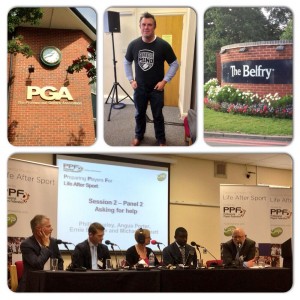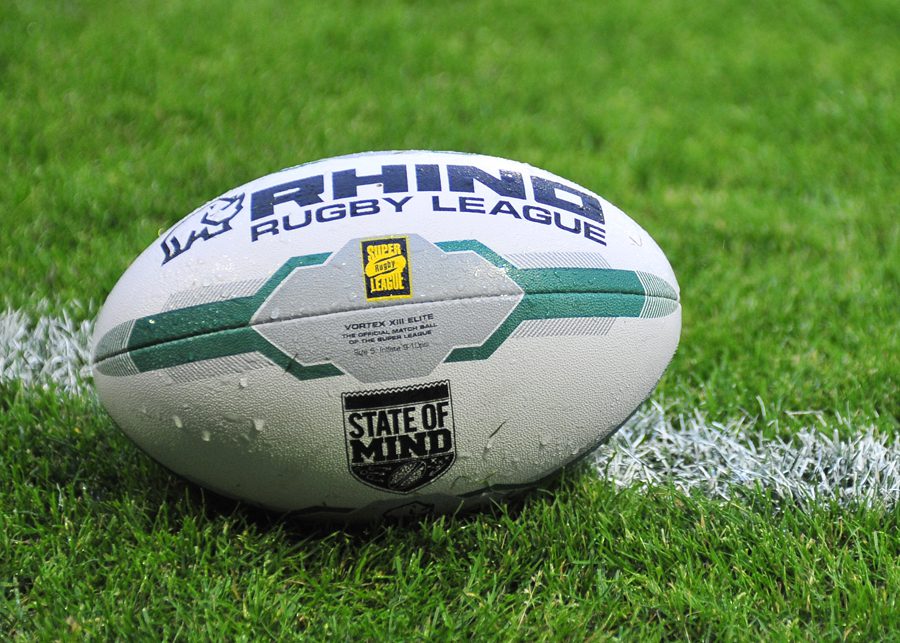Ernie Benbow CEO of League 13 (Super League Players Association) will be on the panel in the second half of a discussion with Duncan Bell, Graeme Fowler and Philip Hopley in a recording completed at the Professional Player federation Conference at The Belfry Golf Course recently
Mark Hovell was lucky enough to be invited to the Professional Players Federation’s Conference on “Life after Sport” held at the Belfry on September 12 2013 and he wrote the following blog.
When I say “lucky”, I must say that it was one of the hardest hitting conferences that I have ever attended. There is no doubt that most people, myself included, think that it is sports people that are lucky – lucky to be able to play a game they clearly love to a professional standard and make a living from it. However, this conference certainly showed the darker side of sport – what happens when it’s all over.
The Professional Player’s Federation has a unique position in sport. It is able to bring together the players’ associations from all the major professional sports, whether individual or team based. There were representatives on the day from the Professional Cricketers Association, the Rugby Players Association, League 13, the PFA, the League Managers Association, the British Athletes Association, League Football Education, etc.
The day started with some amazing statistics. Angus Porter, the Chief Executive of the PCA and David Barnes the Rugby Director at the RPA presented the results of the first UK survey of the experiences of retired players in cricket, rugby union, rugby league, horse racing and football.
It was impressive survey size with 1,200 participants (all men) taking part. The participants were all retired sports professionals. They ranged from a 22 year old up to a 95 year old! They also included a number of internationals.
Some of the highlight stats:
•97% were proud of being a sportsman;
•79% were satisfied with their lives;
•49% still had paid involvement of some sort in their sport;
•90% needed to work after their sporting career had finished;
However:
•35% did not feel in control of their lives for 2 years after finishing;
•24% admitted to physical, mental, addictive or financial problems;
•16% had suffered from depression or despair after retiring.
At the Conference we heard from Duncan Bell, the former Rugby Union player and Graeme Fowler the former England cricketer who both spoke candidly about the depression they suffered. We also heard from Andrew Jordan an ex-professional footballer about his problems after his career was cut short due to injury.
It’s impossible to describe in this blog just how difficult things can become for players after their careers finish. It was incredibly difficult to listen to, so you can only imagine how difficult it is for them to talk so candidly about the problems they had faced and were stilling dealing with.
On 9 October 2013 please listen out for the BBC Radio 5 programme facilitated by Eleanor Oldroyd. You really need to listen to both Duncan and Graham’s interviews (as they were recorded live for the radio) to start to understand what happens to many sports people. That coupled with the recent programme on Paul Gascoigne will leave you to think again about whether sports people are truly “lucky”. It goes on air for an hour at 9.30pm.
It was clear that all sports people go through the 2 year transition period from finishing playing to adapting to the next phase of their lives. Some adapt to new careers very quickly, others less so. The primary objective of the conference was to look at what the Players Associations are doing to help their members.
There’s no doubt there is plenty of focus and support – be it counselling or the work by many to help players into education – the message was clear, it’s never too early.
There were representatives from governing bodies, the clubs and the leagues present too. There is undoubtedly a feeling amongst sports people that once their ability to perform on the pitch comes to an end, their usefulness to their employer ends and often they are just cast aside as the next generation come through. It was felt that there is certainly more that clubs and governing bodies could do but it was very much for the Players Associations to work with the governing bodies, the clubs and the leagues as there is undoubtedly a collective duty to the sport people.
The players associations have worked hard to convey to players that having depression or mental illnesses is not a weakness. If anything it takes strength to admit that you have depression and the support is already there for most players.
It was recognised however that there is always more that can be done and getting players whilst they are still playing to prepare for their future is absolutely key.
More stats:
•23% took 2 years to come to terms with their career ending; but
•that percentage rose to 42% if retirement was not on the players own terms.
So many careers end early through injury.
As I have already said, the message coming from former players was incredibly powerful and the Players Associations are using former players who had suffered from depression or addictive illnesses more and more to deliver the message.
The conclusions of the Conference were that:
•it is key to raise awareness of the issues,
•to continue to educate the players particularly whilst they are still playing,
•to ensure that confidentiality is adhered to and
•to remind players before and after their careers that “it’s good to talk”.
The final word from this Blog however is for Selorm Kuadey. At his parents’ request we all watched a video that he had made with the RPA to be shown to young rugby players. He had been a successful youth player for England’s U19 and U20 and was playing for Sale Sharks but his career was snatched from him prematurely due to injury. He was talking in the video about the importance to prepare for a career outside of sport in case a player’s career was ended by injury, just like his had been. Sadly only months after making the video he committed suicide, at just 24 years old.
From the outside he appeared to be coping well with his transition, but at the critical moment he wasn’t coping at all.
His parents wanted all (Players Associations, clubs, Governing Bodies, alike) to remember how important it is to involve the families too and to note just how much work there is to be done for the players.

